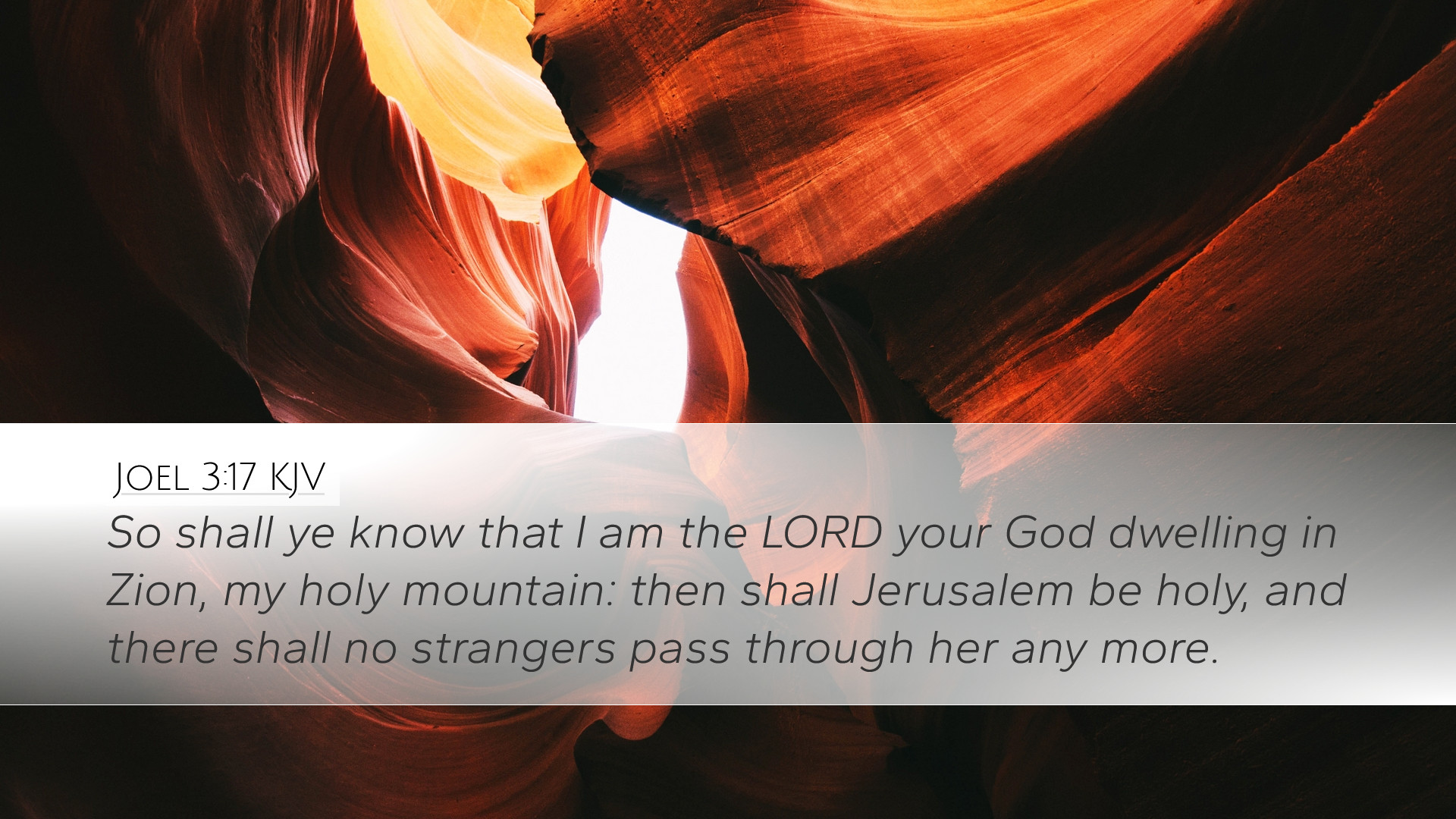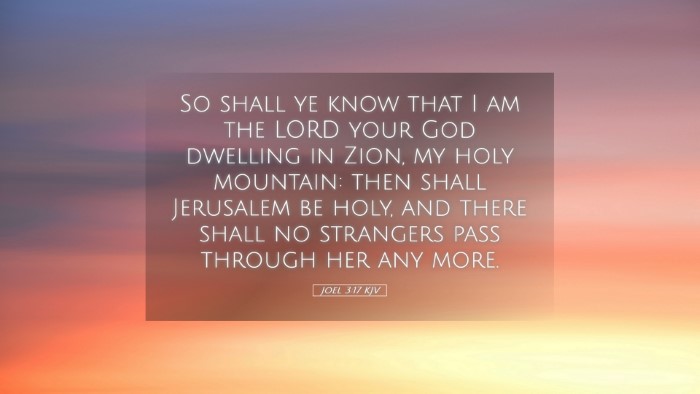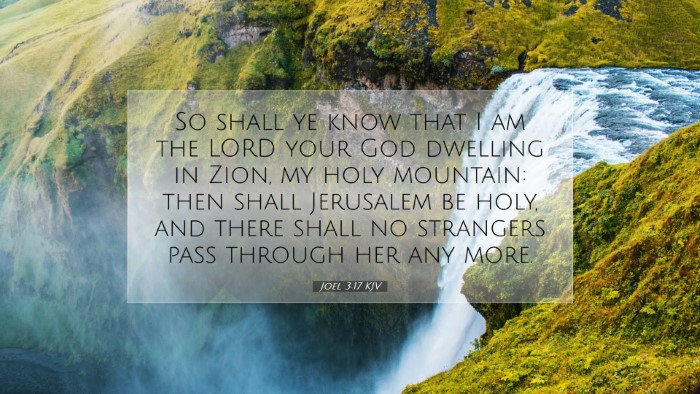Old Testament
Genesis Exodus Leviticus Numbers Deuteronomy Joshua Judges Ruth 1 Samuel 2 Samuel 1 Kings 2 Kings 1 Chronicles 2 Chronicles Ezra Nehemiah Esther Job Psalms Proverbs Ecclesiastes Song of Solomon Isaiah Jeremiah Lamentations Ezekiel Daniel Hosea Joel Amos Obadiah Jonah Micah Nahum Habakkuk Zephaniah Haggai Zechariah MalachiJoel 3:17
Joel 3:17 KJV
So shall ye know that I am the LORD your God dwelling in Zion, my holy mountain: then shall Jerusalem be holy, and there shall no strangers pass through her any more.
Joel 3:17 Bible Commentary
Commentary on Joel 3:17
Verse Context: Joel 3:17 states, "So shall ye know that I am the Lord your God dwelling in Zion, my holy mountain: then shall Jerusalem be holy, and there shall no strangers pass through her any more." This verse serves as a conclusion to a series of prophecies concerning the restoration and promised security of God's people.
Significance of Zion
The mention of Zion in this context has profound theological implications. Matthew Henry emphasizes that Zion symbolizes God's dwelling place among His people, representing both physical and spiritual sanctuary. This sacred mountain becomes the epitome of divine presence and fulfillment of God's promises.
According to Albert Barnes, Zion's significance extends beyond geographical location; it embodies the covenant relationship between God and Israel. It serves as a reminder of the holiness required to dwell in God’s presence, which foreshadows the ultimate redemption brought through Christ.
The Holiness of Jerusalem
Joel prophesies a time when Jerusalem will exemplify holiness. This promise points to a transformative era where God's people are sanctified and set apart. Adam Clarke elaborates on this aspect, stating that true holiness is not merely a ritual observance but a condition of the heart and life, reflecting the character of God in the community.
This is echoed in the writings of Matthew Henry, who notes that holiness in Jerusalem would lead to the absence of impurities and foreign influences, establishing a holy city that is representative of God’s righteous governance.
No Strangers Will Pass Through
The phrase "there shall no strangers pass through her any more" signifies the complete restoration and protection of Jerusalem. Albert Barnes interprets this as an assurance of security, indicating that God's people will no longer suffer invasion or oppression. This reflects a shift from vulnerability to invulnerability, signifying the establishment of God’s Kingdom.
Adam Clarke further expounds that the removal of strangers represents the absence of idolatry and sin, emphasizing that true peace and sanctity can only be maintained in the presence of God. The ultimate fulfillment of this promise can be seen in the New Testament, where the Church becomes the spiritual extension of Jerusalem, free from the defilement of sin.
Interpretation and Application
In interpreting Joel 3:17, scholars find layers of meaning applicable to modern contexts. Matthew Henry reflects on the hope embedded in God’s assurances; believers are encouraged to see their own lives as temples of the Holy Spirit, called to reflect the holiness of God. This entails a life of separation from worldly influences and a dedication to God’s service.
Furthermore, Albert Barnes implores pastors and theologians to recognize the prophetic nature of this verse, connecting it to the eschatological promises of God’s ultimate reign. The community of faith is reminded that God's providence and presence bring peace amidst turmoil, serving as a comfort to those who feel besieged.
Theological Reflections
This passage prompts deep theological reflections regarding the nature of God's holiness and His relationship with humanity. Adam Clarke suggests that the significance of God's dwelling place challenges evangelicals to acknowledge the holiness mandated for individual and corporate faith life.
Moreover, Matthew Henry reiterates a call to holiness, urging believers to live lives worthy of the grace they have received. This means embracing the transformational power of God’s presence, which not only cleanses but also empowers the faithful to exhibit God’s character in the world.
Conclusion
In conclusion, Joel 3:17 serves as a profound reminder of God's commitment to His people and the holiness required for communion with Him. The insights drawn from Matthew Henry, Albert Barnes, and Adam Clarke collectively urge believers to uphold the tenets of faith and holiness, emphasizing the security found in God's promise to dwell with His people. This passage not only reassures the faithful of God’s protective presence but also calls for a deepened commitment to a life reflecting His holiness.


